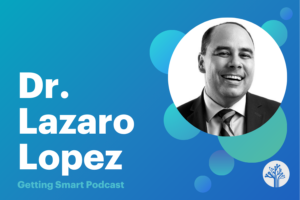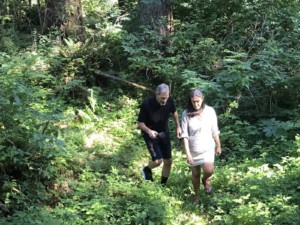Podcast: Exploring Inquiry with Kimberly Mitchell

Today, the Getting Smart team is talking with Kimberly Mitchell about her new book, Experience Inquiry: 5 Powerful Strategies, 50 Practical Experiences, that explores five strategies any teacher or parent can use to promise inquiry and curiosity.
Kimberly Mitchell experienced her first inquiry-based lesson watching a colleague at an international school in Quito Ecuador — and been hooked by the power of inquiry ever since!
After working with teachers around the world on developing great inquiry practices, she started Inquiry Partners in 2014 to broaden her reach. Kimberly now teaches several undergraduate courses at the University of Washington’s College of Education, where she continues to ‘walk the talk’ of inquiry.
In this episode, Kimberly speaks about her book, Experience Inquiry, and the five key strategies within it: 1) get personal, 2) get curious, 3) ask more, talk less, 4) explore the evidence, and 5) extended thinking time. She gives her thoughts on why teachers should make the time for inquiry, why these five strategies are incredibly important for getting started with an inquiry, and why inquiry is such a powerful concept.
Key Takeaways:
[:15] About today’s episode.
[1:05] About Kimberly’s early education.
[3:00] When and where did Kimberly find her calling to teach?
[5:00] How did Kimberly originally get to Quito Ecuador?
[6:55] What was so inspiring and unique about Kimberly’s time in Quito Ecuador?
[8:04] How long was Kimberly at the International School of Athens for?
[8:51] How have Kimberly’s experiences teaching internationally helped form her ideas about inquiry?
[12:37] Why has inquiry become such a focal point for Kimberly?
[15:55] Why ‘getting personal’ and making a connection is the first strategy listed in Kimberly’s book, Experience Inquiry.
[17:27] The second strategy of Kimberly’s book: get curious.
[18:07] Kimberly’s tips for staying curious.
[20:00] Kimberly’s third strategy from her book: ask more, talk less.
[23:02] Kimberly’s thoughts on how coaching and ed talk will help teachers become more metacognitive about the balance between questioning and telling.
[25:14] The fourth strategy of Kimberly’s book: explore evidence.
[27:48] The fifth strategy in Kimberly’s book: extended thinking time.
[30:40] Kimberly thoughts on whether or not a mixture of project-based learning and open-ended activities promotes inquiry.
[32:55] How and where should teachers make time for large-scale inquiries?
[35:56] Why place is powerful — especially paired with inquiry.
[37:16] Where to learn more about Kimberly’s work.
Mentioned in This Episode:
Inquiry Partners
Experience Inquiry: 5 Powerful Strategies, 50 Practical Experiences, by Kimberly L. Mitchell
University of Washington’s College of Education
International School of Athens
Bill & Melinda Gates Foundation
Argentina Teach for All
“Dan Finkel: 5 Ways to Share Math with Kids,” Ted Talk Video
“New School Formula: Harder Questions and Fewer Answers,” blog post by Tom Vander Ark
Teaching As a Subversive Activity, by Neil Postman and Charles Weingartner
Teaching with Your Mouth Shut, by Donald L. Finkel
The Earshot App
Common Sense Media
The Wonderment
Kimberly’s Twitter: @InquiryFive
For more, see:
- Episode 188 with Jim Tracy of Woodrow Wilson Academy of Teaching and Learning!
- Teacher Appreciation Week: Creating a Culture of Appreciation
- Learner-Centered Schools in Albemarle County
Stay in-the-know with innovations in learning by signing up for the weekly Smart Update.








0 Comments
Leave a Comment
Your email address will not be published. All fields are required.